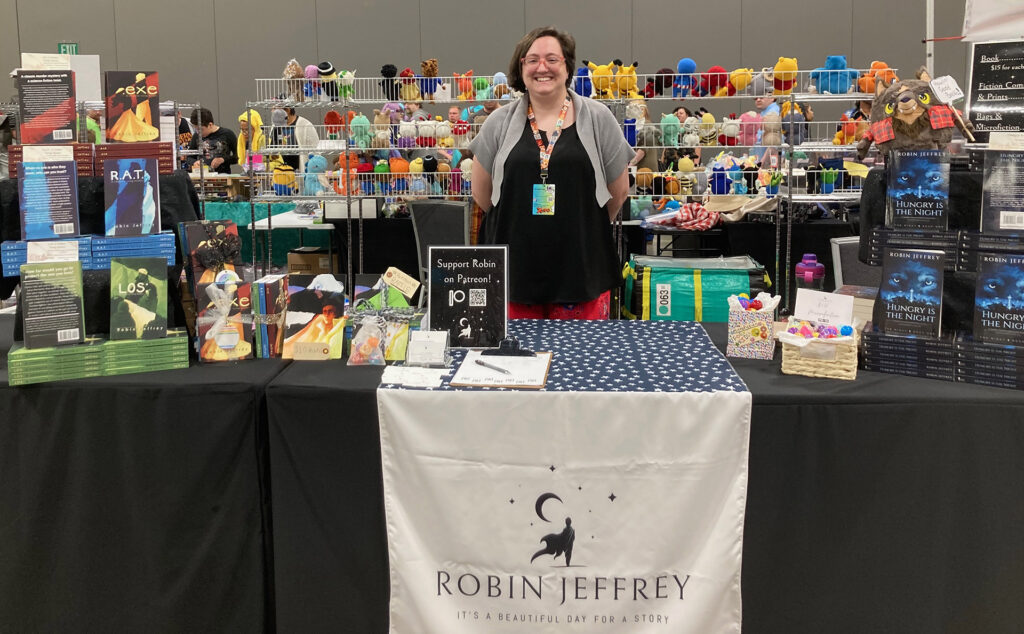The Enigma of Robin Jeffrey: Insights into Creating Thrilling Mystery Novels
Discover why Robin is a master programmer of perplexing puzzles, from the hi-tech world of robots to the supernatural realm of werewolves.
“I can talk about the craft of writing for hours. I never get tired of talking about writing, period. I also never get tired of talking about how to connect with readers. I think that’s a super important part of being an author, especially an independently published author these days”
ROBIN JEFFREY ON CONVENTION PANEL AND WORKSHOP DISCUSSIONS
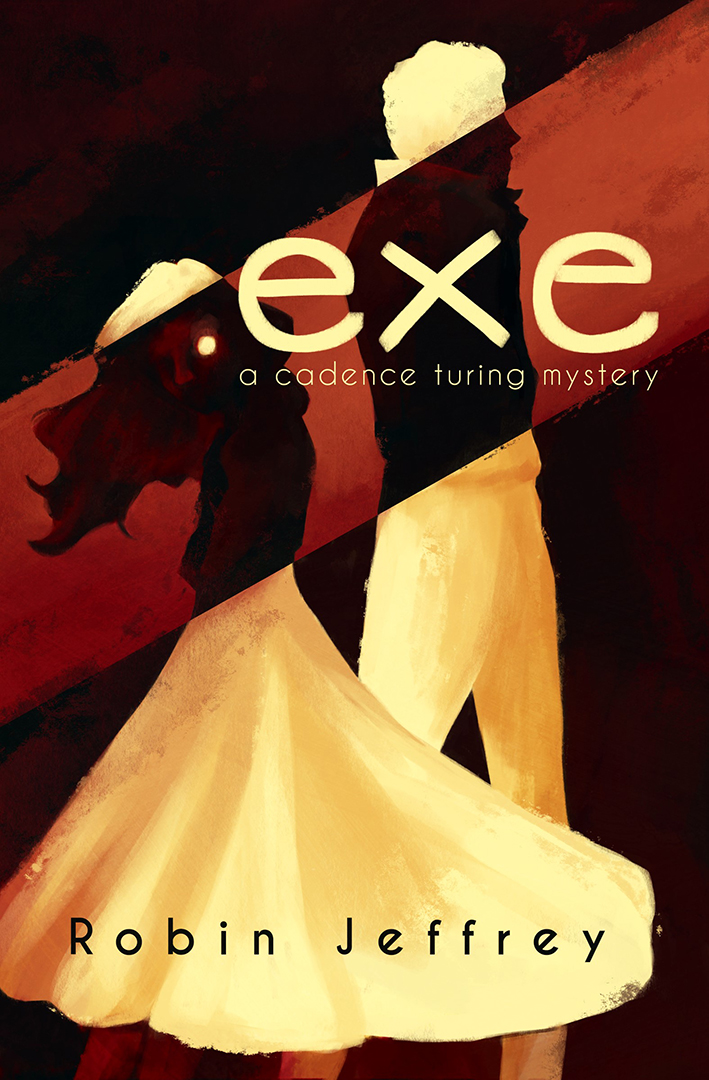
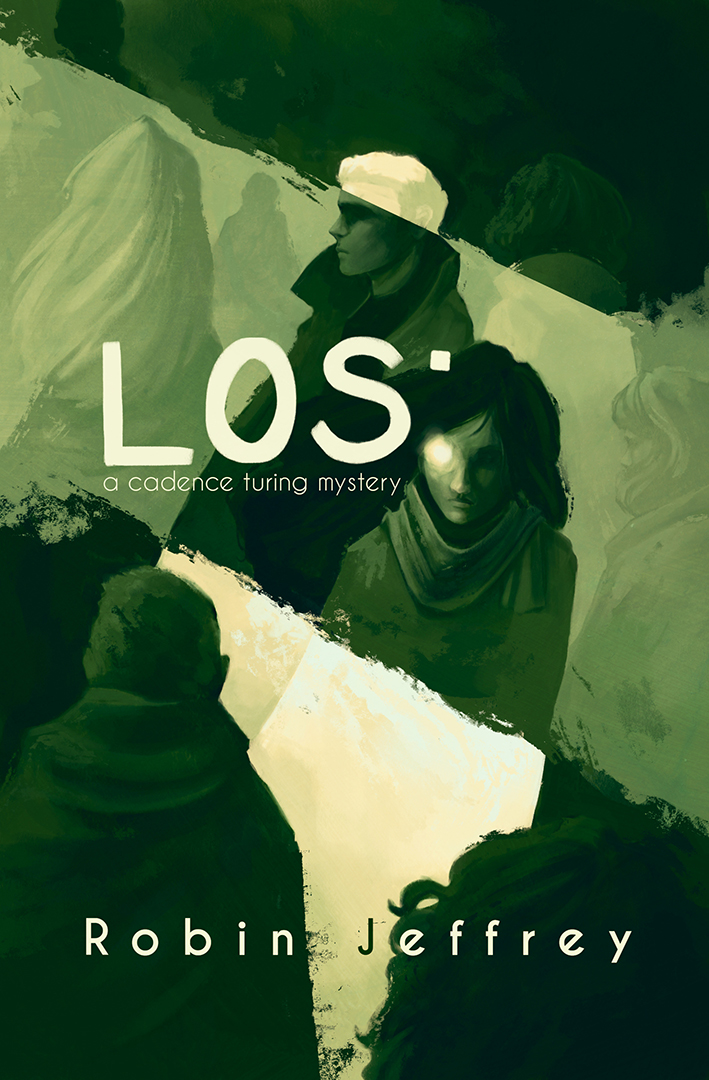

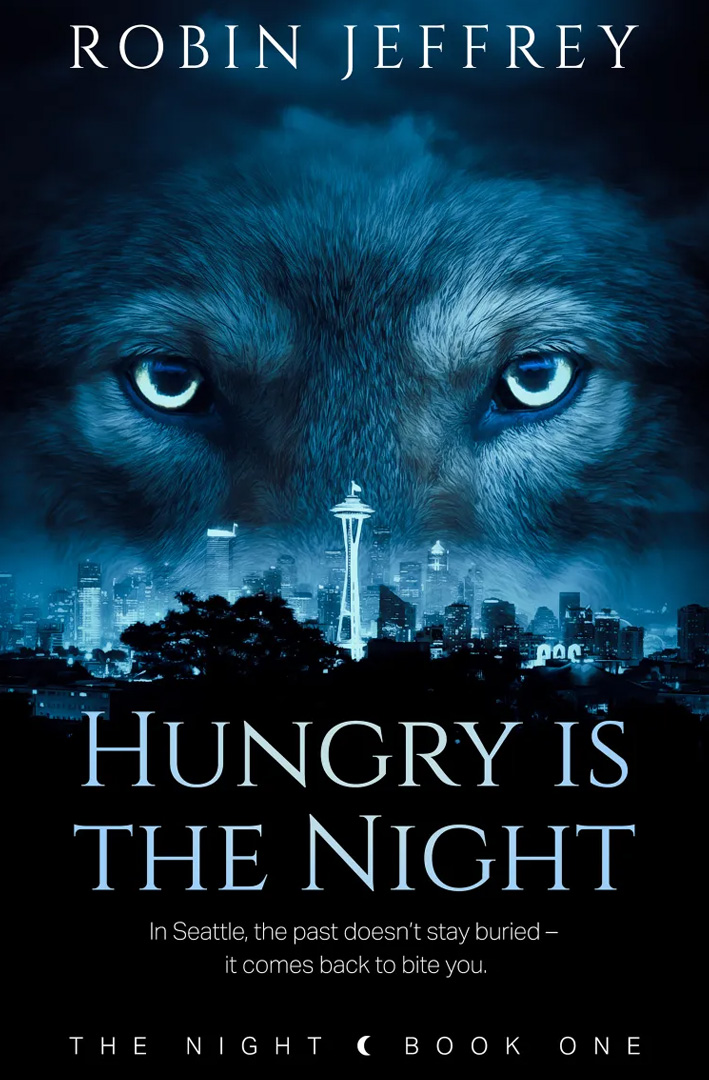
obin Jeffrey is an author of the urban fantasy series, The Night, as well as the author of the science fiction series, The Cadence Turing Mysteries. With a knack for the inner workings of people’s minds, Robin writes microfiction, flash fiction, and novels that entertain and spark important conversations about freedom and the future of governance. Robin teaches writing workshops, is a lifelong storyteller, and was an academic librarian. Her out-of-control comic book collection helps her aspire to being a future android.
We caught up with Robin after Lilac City Con, in Spokane!
Robin Jeffrey: Well, at the risk of sounding obvious, I love to write. I love books. I have a deep respect for books and the written word. I think everyone deep down is a reader, whether they know it or not. I think people who say, “oh, I don’t read, or no, I don’t like to read.” They just haven’t found the right book. They haven’t been exposed to reading in the right environments, in the right context. I think everybody is a reader. They just need to find what they want to read, and I think once they do that, it can be enormously powerful and life transforming for them. I truly do believe in the power of information to bring people together rather than tear them apart. I think information is enormously powerful and can do a lot of good in the world. I’ve been writing with an eye to publishing for the last 14 years, but I’ve been a storyteller all my life. In the publishing world, I cut my teeth on microfiction and flash fiction, so very, very, very short, short stories, and then I jumped right to novel writing, which is always fun. So I either write things that are extremely compact or I write entire books. That’s pretty much the only way I go. I really do love mentoring writers at any stage in their career. I find I have a real passion for teaching, and I love meeting readers. I love connecting directly with people who have enjoyed my work and are looking for their next big read.
Robin Jeffrey: So, first of all, I think pretty much all of the androids in my books would object to being called sidekicks. Cadence and the other androids are fully fleshed out characters in their own rights. Cadence Turing very much is the Sherlock Holmes to my narrator, Chance Watson. But to answer your question, The Cadence Turing Mystery series is the series that includes various android protagonists. So that’s three books strong so far. I think including robots and androids is so important to the development of the plot and themes of those books because they remind us of our own humanity. Androids reflect back our core values and our core defects in such a stark and inescapable way. You know, I always say that science fiction books ask, “what makes humans human?” And mystery books ask, “why do humans do what they do?” And I feel like androids and robots are a way of answering both of those questions at the same time, right? They are a great way to answer what makes humans human? While also going, “well, why do humans do that?” Let’s examine the motivations behind things like gender presentation, and bigotry, and all that kind of stuff. Let’s deconstruct that a little bit, which is what I do in these books.
Robin Jeffrey: So there are three authors that have influenced me the most, and really only one of them is in my writing genre of choice. If I even have a writing genre of choice, I tend to write pretty eclectically, as you can see. I do kind of urban fantasy mystery or Sci-Fi mystery, or even a little bit of romance in there. I tend to blend genres pretty freely. But the three authors that have influenced me the most, the one that would fit in the mystery genre firmly, is Agatha Christie. I started reading Agatha Christie when I was very young, ten or eleven, and I was really taken with the way she constructed mysteries around people. You know, the mystery wasn’t so much, oh, how did they do it? It was the why did they do it? What drove someone to an act? What was the relationships between people that made them make a certain choice? I found that super fascinating, and I think Agatha did that very intentionally. You know, she wanted to examine people and why they work the way they do. The other two authors that have influenced me the most have to be Terry Pratchett and Neil Gaiman, who write pretty exclusively in the fantasy space. I do not write fantasy, or haven’t really, so far, but I love the way they do so often blend genres. I love their humor, I love their unflinching examination of human foibles. And ultimately, though, their optimism about humanity. I do think both authors, all three, really ultimately think that there is something good about people and that even when we show ourselves to be the most monstrous, we can come back from that. There are other good forces inside of us that will prevail in the end, and I find that very hopeful.
Robin Jeffrey: What a wonderful question. No. So my characters are not based on real people or real robots. I often create characters, well, first based on their voice. I generally hear my characters in my head before anything else. Usually a conversation between two of them is how a book starts for me in my brain, and everything else sort of spins out from there. I think this probably comes from the fact that I kind of grew up with a cinematic and theatrical background, so dialogue was always very important in my house. My sister and I would quote whole scenes from film and theater endlessly back and forth at each other. So I find the voice of my characters to be the most important thing for me to get right, right off the bat. Once I do that, I find that the rest of their development comes fairly easily. Once I know how they speak, it informs what their background was, where they grew up, what kind of relationship they had with their parents, with their friends, all that sort of thing. All just kind of spirals out of that. Now, I actually told a lie. There is one character in one book that is based off of a bully I had in elementary school, but I will not reveal who that is, so see if you can spot him.
Robin Jeffrey: So .exe came about as the title of the first Cadence Turing Mystery book because I was taking some programming classes at the time as part of my library in information science graduate degree, and I loved the idea of titling a murder mystery book after the extension for an executable file. I just thought that was so clever and so funny, and it turns out to have been a really good naming convention to keep going through the rest of the series. I think it’s extremely appropriate that Cadence herself would probably have approved of naming these books after computer language. It is, after all, what she speaks, and she would want other computer language users to feel welcome in the series.
Robin Jeffrey: This was a tough one because frankly, they’re all pretty cool translated into code. At least The Cadence Turing Mystery ones are extremely cool when translated into code, but I think the coolest one when read out loud by a robot like you would be “R.A.T.” a Cadence Turing Mystery. It would be something like function R.A.T. Cadence Turing Mystery. The implementation of the mysterious function is hidden. It is said to involve complex calculations only those with the right knowledge can decipher. I know this because I put it into a JavaScript translator. It would look something like that. That would be amazingly cool in my opinion.
Robin Jeffrey: Oh, I love the idea of some flash movies. That would be really cool. Yeah. So flash fiction is very, very short, short fiction. It’s not as short as microfiction, but it’s pretty condensed. Flash fiction, generally speaking, is a complete short story in a thousand words or less. Microfiction can vary from publisher to publisher or writer to writer, but I consider microfiction to be anything at a hundred words or less. Flash fiction once again is a thousand words or less. But this is, like I said, a complete short story. So it has a beginning, middle, end. It has fully realized complex characters, it has themes, it has setting, it has all the same things that a full short story or even novel has, but it’s been compacted into this very short space. I love writing flash fiction. I think it is enormously powerful. I think it is extremely fun to write and challenging too. It will really hone your skill as a writer. As far as like characterization, word choice, sentence structure, it will make you better at writing longer pieces. I absolutely think everyone should try flash fiction, and flash movies sounds like a great idea.
Robin Jeffrey: So I’m going to answer the second part of the question first. Yes, absolutely. The worldbuilding for my novels is very different from the world building for my flash fiction or microstories. When I worldbuild in my flash fiction or microfiction, I tend to focus on little details kind of exclusively. I don’t spend a lot of my own time or the reader’s time on big picture stuff. When I world build for my novels, I have extensive notes on stuff that never makes it into the novel, but that I need to know as the author. Stuff that like so when I wrote the first Cadence mystery book .exe, I had this whole plan for the city of Römer about how their water system worked. I didn’t need to know that for the first book. I’m not even entirely certain I needed to know it for the second, but it came in handy for the third. But it’s stuff like that that I put into worldbuilding for my novels that I don’t for my flash fiction, because in my flash fiction, I know I’m never going to get to it. For my novels, though, I need to know that level of big picture detail in order to make the world feel as fleshed out as I want it to be. As far as how I go about doing that, I spend a lot of time daydreaming, to be perfectly honest. I think a lot about what the future might hold. I think about how it might be different, how it probably won’t be that different, in some ways. I think humans like to pretend that in the far flung future, things will be unrecognizable. But I tend to think that we are, at our core, who we are, and that means that we like our certain creature comforts. You know, in some ways, life now is very different than it was in the 1700s. But in some ways, people be people, and people will always be people. So I find that kind of core to the way I worldbuild my future novels. Yeah, but in other ways, I’d like to have a little fun and go, “wouldn’t it be crazy if X happened in the future?” And how would I make that work? What would be the history leading up to that? Yeah, I just kind of daydream and write it down. And if it comes in handy for one of my later novels or for the novel I’m writing, then great. If it doesn’t, then I just kind of keep it in reserve as something that I know and can trot out later.
Robin Jeffrey: If I could have any futuristic gadget to help with my writing, it would be a plot hole detector. You know, it would just sit in my word processing program and just go off. If it detected a plot hole that I had just created and tell me where it was, and I would have to go back and fix it.
Robin Jeffrey: Yes, I was a librarian. As a matter of fact, I still pretty much consider myself a librarian. Once a librarian, never not a librarian. I was an academic librarian for most all of my library career, actually, which means I worked in college libraries, community college libraries in my case. And I think the answer is no, my library did not have enough robot books. I think few libraries have enough robot books. You could always use a few more, right?
Robin Jeffrey: So in “LOS”, a Cadence Turing Mystery. That is the third book in The Cadence Turing Mystery series. There is a group of android freedom fighters. They are fighting against a contingency of humans who have invaded their homeworld, Whiston. It’s a moon where the Animanecron, that’s the name of the androids in my world, have lived, and the humans are intent on eradicating them, and these freedom fighters are hoping to fight back and reclaim their world.
Robin Jeffrey: I think this is such an interesting question because the answer is directly opposed to the answer for how I create my characters for my stories, which is, I don’t base my characters on real people, but I do very much develop the political landscape of my stories based on what I see happening in the world around me. I take what is happening currently, what has happened in the past historically, and I take those scenarios and place them in a fictional world, and kind of play out what would happen if the characters I have created were involved in those political environs, just to see if things would go any differently, things resolve happily, unhappily, and to explore possibilities, essentially.
Robin Jeffrey: I would say I have a somewhat strict writing routine and process. I generally write in the morning, so I’m a pretty early riser. I generally get up at 6, 6:30, sometimes a little bit earlier. I like to get up early in the morning before everyone else is stirring. And I usually write, do my best writing, I always say, before lunch. So during that time between waking and lunch, I always start my writing day by doing a ten minute writing sprint. That’s what I call it. Essentially, it’s just ten minutes where I stream of consciousness, word vomit everything that I am thinking onto a page for ten minutes straight. I just type. And that really helps work out any kinks in my brain, helps me center myself, helps me get used to the physical act of writing, and also the act of taking what is in my brain, turning it into language, and pointing it onto a page. So I never start writing without doing a writing sprint first. I do a writing. I do a writing sprint every day. Even when I don’t end up doing more writing after that, I do a ten minute writing sprint every single day. After that, it’s pretty much then I write anything that I feel like, working on whatever book projects I’m working on. If I have microfiction to work on, I work on those. As for any quirky habits for rituals in writing, I do have a tendency to light candles when I’m writing. Not so much for the ambiance as far as like, lighting, but for the smell. I find that depending on the scent of the candle, it can really put me in the right frame of mind for what I’m writing. So I’ll often be in a completely electrically lit room and have a candle going just to have the smell of one story I was working on. I had the smell of a garden market stall, so it was like vegetables, and fruits, and flowers all. It was a beautiful scent and it really just put me in the mind of what I was working on. Which is, yeah, I think maybe a little, a little kooky, and certainly probably a little strange for a robot to try to wrap their circuits around, but it works for me.
Robin Jeffrey: If I could have a coffee break with any of my characters, it would probably be Henry, from The Cadence Turing Mystery series. Henry is Chance’s best friend. He becomes Cadence’s best friend, one of her best friends, and I just feel like we’d vibe really well. He’s a little stoic, but he’s also a writer. He writes poetry and historical nonfiction. Like, he writes essays on history and on current events, too, politically. And he’s just a really nice guy. He’s just so cool. I love Henry. I’m so glad I created him. And what cosmic treat would we share? Probably Petrarch and whiskey. Probably have a couple glasses of nice Petrarch and whiskey. Sit back, just relax. Sounds really nice.
Robin Jeffrey: This is an easy one. I love meeting readers. I love meeting fans. I love meeting people who love books. It is the best. I never get tired of it. I never get tired of meeting new readers, people who have never heard of me or my books. I never get tired of reconnecting with people who have already picked up one or two of my books, and are looking to get the rest. I love it. I love hearing what people thought about my work. I love hearing what they enjoyed. I love hearing what made them frustrated, what made them want to chuck the book across the room. That’s always fun, too. I love how creative everybody is at these comic or Sci-Fi conventions. Everyone is just there for the love of fandom, for the love of the genre, and they’re having a great time. I’m so glad I get to be a part of that.
Robin Jeffrey: So I can talk about my work all day long at panels or workshops. I can talk about the craft of writing for hours. I never get tired of talking about writing, period. I also never get tired of talking about how to connect with readers. I think that’s a super important part of being an author, especially an independently published author these days. And I love talking about what’s worked for me, what I’ve seen work for other people, what hasn’t worked. I think that’s super important and doesn’t get talked about enough – is that connection between writer and reader. So I love talking about that kind of stuff during panels and workshops at conventions. I also love talking about genre blending and kind of genre busting, you know, being like, “no, I don’t need to follow these tropes. I’m gonna do my own thing with them and see what happens.” That’s super fun and the direction that fiction should be going in right now.
Robin Jeffrey: I’m really happy to say that I’m kind of living my dream project. The Cadence Turing Mystery series was kind of a dream project for me. A Sci-Fi murder mystery, androids meeting Agatha Christie. It was a crazy idea that I’m getting to explore fully, and that’s pretty cool. Any other kind of out there genres I’d like to do in the future? I’d really like to try my hand at some fantasy just because I’ve never done it before. And I think it could be really fun and challenging to dig into a fantasy world. Yeah.
Robin Jeffrey: I really hope that readers, if they take anything away from my work, it’s this. That they’re not alone, and that no one is ever alone. And that feeling alone or thinking that you’re alone, acting like you’re alone, it’s where a lot of problems have their root. You know, remembering that we exist communally, you know, we exist with other people, for other people, symbiotically with others, is super important. And I think a really hopeful thing, you know, that even at your darkest, lowest moments, there is something, someone out there who can reach out and lend a hand and tell you that they see you, you’re not alone.
Robin Jeffrey: There are so many people who have been so helpful to me this past year. I could not possibly name them all. If there was one person I’d want to shout out that has been my rock, it would have to be my husband. Phil is just an amazing human being. He has supported me through all my crazy creative and artistic endeavors. He has been my biggest fan, my best support, the best partner, and the best booth partner too, the best person to have at a convention to run and get coffee or food or chat people up while I need to take a seat because I’ve been standing for 6 hours. He just always is there for me and always is supporting me in my work, and I couldn’t do this without him.
Robin Jeffrey: I can always be found on my website. That’s at robinjeffreyauthor.com. I can also be found on Facebook @facebook.com/robinjeffreyauthor. I can be found on Instagram. On Instagram, my handle is @thesidekick_ig. I’m also on TikTok at the handle @thesidekick_author. I love connecting with people. I love sharing what’s going on with my work. I’m also on Patreon. You can find me there under RobinJeffrey. So please come connect with me. Come say hi, let me know what you’re working on and I’d love to chat.
Robin Jeffrey: I think we can make the world a better place by accepting each other. That’s not the same thing as liking or proving or anything like that. But if we accept each other and treat each other with respect, I think that can go a long way to making the world a better place, to just recognizing that we’re each individuals with our own stories and our own paths in life to take. And none of them are easy, and that really we’re here in this universe to lift each other up and make those paths easier if we can, not harder.
Robin Jeffrey: Thanks so much for having me. This has been super fun. I’m always happy to talk about robots and can’t wait to become one. Cheers.
Discover Robin at https://robinjeffreyauthor.com/ or find her on:
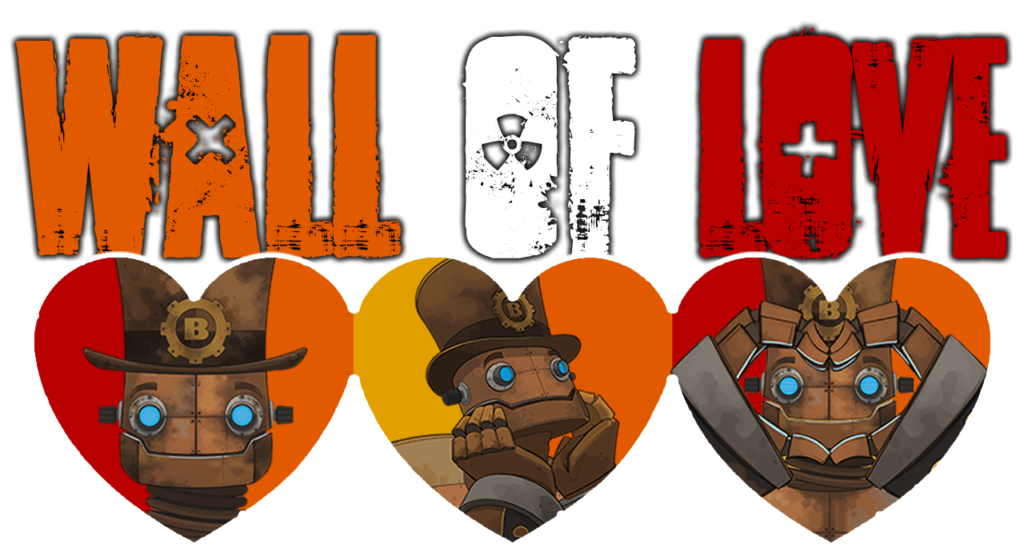
Did you know that you can record a video or type a comment for this POPcast transmission?
BOOM’s Transmissions, a post-aPOPalyptic POPcast brought to you by BOOM Rattle BOOM LLC.

